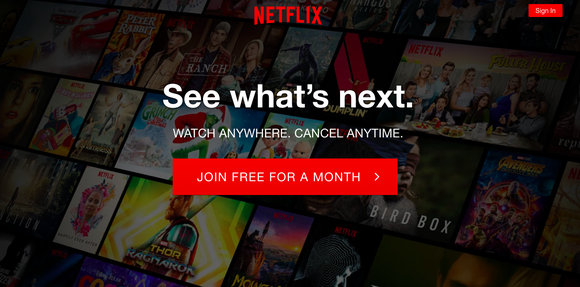Netflix Drops Biggest Price Hike in Its 12-Year History
Netflix (NASDAQ: NFLX) raised its U.S. monthly subscription prices for the fourth time in the 12-year history of its streaming platform. The price hikes were between 13% and 18% depending on the plan, which makes this Netflix's largest subscription price hike ever.
Although Netflix's last price hike was just 15 months ago, viewers are unlikely to react strongly to this most recent hike. That's because the streaming site has proved its worth in the past few years. The same could be said for Amazon and its recent Prime subscription price hike to $119 per year, up from $99.
Netflix is teaching content platforms that people are willing -- even eager -- to pay up for quality content. In fact, Netflix shares were up nearly 7% on Jan. 15, the day the price hike was announced.

Netflix is hiking up its monthly subscription price for the fourth time. Image source: Netflix.
Netflix's history of price hikes
Netflix has had a quick rise to the top position in the video-streaming market. The company has gone from zero to nearly 140 million subscribers worldwide in 12 years. Five years ago, Netflix started investing in original content, and its content budget has ballooned from $3 billion in 2014 to $8 billion in 2018. Unfortunately, its debt has also grown. Netflix has $18.4 billion in both long-term debt and shorter-term obligations, according to its last quarterly report.
With its continuously growing content budget and debt, Netflix needs to raise cash -- lots of it. And one way to do that is with an annual price hike. This most recent price increase is expected to give the company $1.18 billion in incremental revenue from its 57 million U.S. subscribers, according to RBC Capital estimates.
Netflix's previous price hike came in October 2017 when it raised its standard plan by $1 to $10.99. On Jan. 15, Netflix raised the price of this plan by $2 to $12.99. In addition, its basic (non-HD) plan's price went up by $1 to $8.99, and its premium plan went up by $2 to $15.99.
Here's a brief look at Netflix's price increases for its standard plan since 2014:
Netflix Price Hikes | May 2014 | October 2015 | October 2017 | January 2019 |
|---|---|---|---|---|
Price increase | $1 | $1 | $1 | $2 |
New price | $8.99 | $9.99 | $10.99 | $12.99 |
Data source: Business Insider.
Why Netflix customers don't care about $1 or $2 more
Netflix feels justified in raising prices by $1 to $2 regularly because it believes it's earned that extra change with the increasing quality and quantity of its content library, Netflix's chief product officer, Greg Peters, said on the latest earnings call in October. Last year, Netflix released 700 shows and films on its platform.
Customers seem to agree. A recent Piper Jaffray survey of about 1,100 U.S. Netflix subscribers found that 71% said they thought the platform's content had improved. The results of the survey led the investment services firm to believe that so long as people continue to believe Netflix improves each year, then it can continue its annual price hikes with little to no pushback.
In fact, Netflix's last price hike went over well for the same reason. After raising prices in October 2017, Netflix reported 8.33 million new global subscribers for the fourth quarter. At the time, this figure broke its previous record of 7.05 million new subscribers. So it's safe to say the price hike didn't scare customers away. And considering the lineup of content due out in 2019, including the third season of its hit original series Stranger Things, subscribers will most likely shrug off the $1 or $2 subscription increase.
The bottom line is, Netflix is still an incredible deal, and will remain so in spite of a few more inevitable price hikes. The recent Piper Jaffray survey also showed that 64% of respondents said they wouldn't cancel their subscription before the price topped $15. That gives Netflix another year or two before subscribers may start to raise their eyebrows.
More From The Motley Fool
John Mackey, CEO of Whole Foods Market, an Amazon subsidiary, is a member of The Motley Fool's board of directors. Natalie Walters has no position in any of the stocks mentioned. The Motley Fool owns shares of and recommends Amazon and Netflix. The Motley Fool has a disclosure policy.